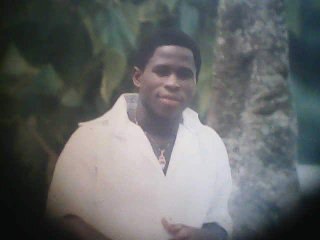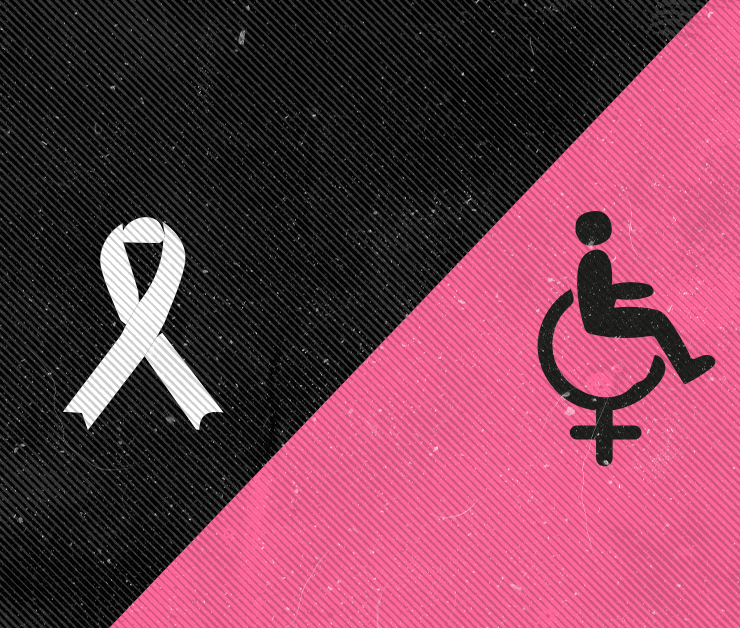“We don’t have a body to bury.” Families of Nigerians missing in police custody want closure
- As #EndSARS protests intensify across Nigeria, Irene Andrew Mbang and Obianuju Iloanya have taken to the streets to demand justice for their missing brothers.

Lagos, Nigeria (Minority Africa) — Andrew Mbang was just about to turn 20 when the police arrested him in 2007 at an apartment, which he rented with two of his friends, Kingsley and Obele in Port Harcourt, Nigeria.
The reason for the arrest is unknown but men from the Nigeria Police Force stormed the apartment while the trio watched a football game and arrested them.
“We got to know of his arrest the second day, some eyewitnesses who saw them taken by the police informed us,’’ Irene Andrew Mbang, his sister who adopted his name, says.
Andrew Mbang had the ambition of working in the oil industry, a multi-billion dollar industry that majorly fuels the Nigerian economy.
Before his arrest, he had started working towards this goal by studying welding and fabrication at Government Technical College in Abak, Akwa Ibom State, and then working as an apprentice while waiting for university admission.
The arrest not only scuttled that dream, but it also left ongoing grief for his family, especially his mother and two siblings who have not seen him since he was taken 13 years ago.
They do not have any idea if he is alive, dead, or in prison.
Like Andrew Mbang, Chijioke Iloanya, 20, was at a child dedication ceremony in Ajali, Anambra State in 2012 when the police arrested him in the company of his friends and other attendees.
Believing it was a minor incident, his mother went to the police station the next day to bail him out.
She was told the arrested persons, including her son, had been transferred to a police unit, the Special Anti-Robbery Squad (SARS) station in Awkuzu, a place she had heard horror stories about.
When she got to the SARS station with her husband, the Officer Commanding (OC) at the time, James Nwafor denied having Chijioke Iloanya or his friends.
“When my parents got to Awkuzu SARS, they were told my brother was not there,” Obianuju Iloanya, his sister, tells Minority Africa.
As they left the station though, Obianuju’s mother coincidentally saw a group of boys being led out and identified her son to be one of them.
“[Nwafor] ordered that they be thrown out of the station,’’ Obianuju says. “The next day, they went back and he told them the boys had been killed and there is nothing that can be done about it. That was where our challenges started.”
Similarly, shortly after Andrew Mbang’s arrest, Irene says her mother went to Old GRA police station in Port Harcourt where the boys were being held.
“She saw them, the three of them but she was asked to come back the next day because the officer in charge, Superintendent Bassey, was not around that day,” she says.
Superintendent Bassey was understood by Irene and her family to be the highest commanding officer on the case.
“We don’t know his full name, my mother got his first name on his badge,’’ Irene says. “She left the station and went back the next day and they said they had been transferred to the state’s Criminal Investigation Department.”
But the CID said the boys were not there. When her mother returned to the police station, the police who denied ever arresting the boys chased her, Irene says.
A Notorious Police Unit
Earlier in October, a video of a man, Joshua Ambrose allegedly thrown out of his vehicle by security operatives in Ughelli, Delta State went viral. The officers who are part of Operation Delta Safe (a special unit of Nigeria Army) left an injured Ambrose on the street and vacated the scene in his car.
He survived the incident but the video sparked anger across the country with the ignition of the hashtag #EndSARS, which had been used at different times in the past few years to protest police brutality, harassment, extortion, and killings.
Now, in many parts of the country, thousands of young Nigerians have poured into the streets to demand police reforms and the unconditional disbandment of SARS. At least 15 people have died from excessive force by the police at these protests and several others have been injured.
Two killed as Governor Oyetola’s convoy drives into #EndSARS crowd in Osogbo https://t.co/TiF4DMzDEl
— Peoples Gazette (@GazetteNGR) October 17, 2020
Suspected hoodlums on Friday swooped on #EndSARS/SWAT protesters in Benin, killing two protesters. Another protester was killed in Akure when a car rammed into protesters also on Friday. https://t.co/8a6Hh7RkeF @PoliceNG @NGRSenate
— The Nation Nigeria (@TheNationNews) October 17, 2020
Irene, who was in secondary school when her brother was arrested, is now 27 and has been protesting in Ibadan where she now stays, carrying placards with the names of the three boys and asking for answers even 13 years after.
“I want to get justice for my brothers and his two friends. Those boys were too young,” she says, her voice stifled by tears. “Kingsley’s mother died in the process, she had lost a son before Kingsley’s disappearance. She could not cope with missing two sons.”
Irene also says her mother went into a coma and was in shock. “Obele’s sister did not marry because the arrest took place a few weeks before her wedding and she was hoping her brother would show up one day and attend.”
SARS was created in 1992 to stem the tide of armed robbery during a period in which the Nigerian Army and the Police Force were in dispute over the extrajudicial killing of an army officer at a traffic stop.
The unit was meant to be intelligence-driven and to carry out covert operations on cases like armed robbery. However, there is a wide berth between their institutional responsibilities and what Nigerians experience in the hands of officers of the unit.
Due to the unit’s original nature to operate covertly, its officers do not wear a uniform and move about in unmarked vehicles.

Many missing persons have been linked to SARS, popular for its use of torture and extrajudicial killing of detainees.
In 2016, Amnesty International published a report on how former detainees have been subjected to “horrific torture methods, including hanging, starvation, beatings, shootings, and mock executions in the hands of corrupt officers from the feared Special Anti-Robbery Squad (SARS)’’.
In Chijioke Iloanya’s case, all avenues Obianuju and her family took to get justice and answers hit a brick wall, including church visitations and various petitions to the Inspector of Police and the National Human Rights Commission.
“I can’t believe I am speaking of him in the past tense… what if he is alive somewhere?’’ she says.
Obianuju has joined End SARS protests in Abuja, Nigeria’s capital, ensuring her voice and the questions about her brother are heard despite the brute force the state continues to respond with.
“On Friday, we were tear-gassed and beaten. On Saturday, we were tear-gassed and shot at. On Sunday, we were tear-gassed and shot with water cannons,’’ she tells Minority Africa. “If they catch you, you will be beaten mercilessly… I was beaten mercilessly.’’
Scrapping SARS Not enough
After protests broke out, Nigeria’s Inspector General of Police, Mohammed Adamu announced the dissolution of SARS. However, the announcement has done little to assuage the anger of protesters who remain unconvinced that it signifies true change.
Four times in four years, different measures of reforms have been announced with no significant change in the conduct and personnel of the unit.
In 2018, the acting president, Yemi Osinbajo announced reforms and constituted a seven-man committee within the National Human Rights Commission to investigate abuse by SARS.
On June 3, 2019, the committee submitted its 2,084-page report to President Buhari. To date, the report is yet to be implemented and people like Chijioke Iloanya and Andrew Mbang are still missing.
”I want justice, that is why I keep going out here, keep protesting and shouting my voice out,’’ Obianuju says, her voice hoarse from hours of screaming. “We don’t even have a body to bury… it is painful living that kind of horrible life, it is unfair.”
For her, scrapping the unit is not progress if there’s no justice.

More recently, Nigerians took to social media to demand for the arrest of Nwafor, the OC in Chijioke Iloanya’s case who was accused of committing various extrajudicial killings of SARS detainees during his time at the Anambra State SARS office.
Nwafor went on to become the senior special assistant on security to the Governor of Anambra State, Willie Obiano who on Thursday, October 15, while addressing a crowd of protesters announced that he had sacked Nwafor.
While this might appear to be short-term succor, what is most important for Obianuju is an answer to what happened to her brother. “What I want is justice, full justice. If he is alive, let him tell us what happened… if he is dead, let him give us an answer to what happened,’’ she says.
Between 2009 and 2010, Irene’s family heard from Superintendent Bassey, the officer who had been in charge of Andrew Mbang’s case, again. It started one day when her mother received a text from him.
The text read, “Some people paid me money to arrest your son. Your son is alive. Your tears are disturbing me.”
By this time, the family had moved to Akwa Ibom State to, according to Irene, escape their trauma in Port Harcourt so when they received the text, they were not able to directly follow up on the case.
“My mother called him and told him she had forgiven him but he should let her know where her son was but he started shouting at her,” Irene tells Minority Africa.
“We also heard [Superintendent Bassey] had been transferred to Akwa Ibom but all efforts [to reach him] were futile because he did not want to speak with us.”
For Irene and her mother, each day is an opportunity to hope for Andrew Mbang’s return.
“We have not mourned… people who lost their loved ones are better, because they have a grave… something physical to hold on to and remember,” she says. “But us, we keep looking every year, no rest, it is like a horror movie, something that haunts you every time.”
“You keep thinking… How did they die? Are they dead? Were they washed down the drain? Were they punished? Were they dropped in an ocean? Did they tie them to a rope? What really happened?”
Ope Adetayo is an editorial intern at Minority Africa. He is a writing fellow at African Liberty. His work has appeared in Aljazeera, Humangle, Africaisacountry, The Stockholm Review of Literature, The Guardian NG, and elsewhere.






